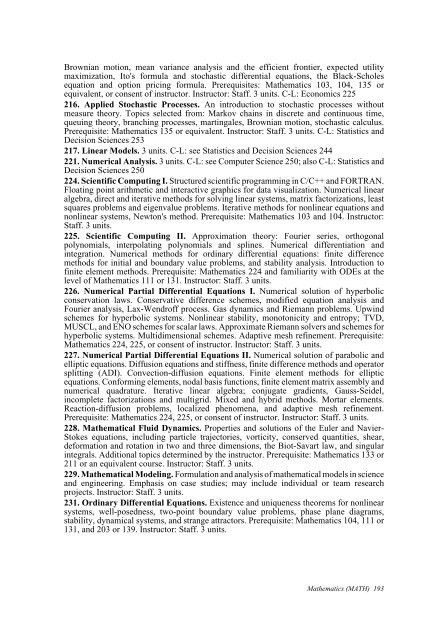2005-06 - Office of the Registrar - Duke University
2005-06 - Office of the Registrar - Duke University
2005-06 - Office of the Registrar - Duke University
Create successful ePaper yourself
Turn your PDF publications into a flip-book with our unique Google optimized e-Paper software.
Brownian motion, mean variance analysis and <strong>the</strong> efficient frontier, expected utility<br />
maximization, Ito's formula and stochastic differential equations, <strong>the</strong> Black-Scholes<br />
equation and option pricing formula. Prerequisites: Ma<strong>the</strong>matics 103, 104, 135 or<br />
equivalent, or consent <strong>of</strong> instructor. Instructor: Staff. 3 units. C-L: Economics 225<br />
216. Applied Stochastic Processes. An introduction to stochastic processes without<br />
measure <strong>the</strong>ory. Topics selected from: Markov chains in discrete and continuous time,<br />
queuing <strong>the</strong>ory, branching processes, martingales, Brownian motion, stochastic calculus.<br />
Prerequisite: Ma<strong>the</strong>matics 135 or equivalent. Instructor: Staff. 3 units. C-L: Statistics and<br />
Decision Sciences 253<br />
217. Linear Models. 3 units. C-L: see Statistics and Decision Sciences 244<br />
221. Numerical Analysis. 3 units. C-L: see Computer Science 250; also C-L: Statistics and<br />
Decision Sciences 250<br />
224. Scientific Computing I. Structured scientific programming in C/C++ and FORTRAN.<br />
Floating point arithmetic and interactive graphics for data visualization. Numerical linear<br />
algebra, direct and iterative methods for solving linear systems, matrix factorizations, least<br />
squares problems and eigenvalue problems. Iterative methods for nonlinear equations and<br />
nonlinear systems, Newton's method. Prerequisite: Ma<strong>the</strong>matics 103 and 104. Instructor:<br />
Staff. 3 units.<br />
225. Scientific Computing II. Approximation <strong>the</strong>ory: Fourier series, orthogonal<br />
polynomials, interpolating polynomials and splines. Numerical differentiation and<br />
integration. Numerical methods for ordinary differential equations: finite difference<br />
methods for initial and boundary value problems, and stability analysis. Introduction to<br />
finite element methods. Prerequisite: Ma<strong>the</strong>matics 224 and familiarity with ODEs at <strong>the</strong><br />
level <strong>of</strong> Ma<strong>the</strong>matics 111 or 131. Instructor: Staff. 3 units.<br />
226. Numerical Partial Differential Equations I. Numerical solution <strong>of</strong> hyperbolic<br />
conservation laws. Conservative difference schemes, modified equation analysis and<br />
Fourier analysis, Lax-Wendr<strong>of</strong>f process. Gas dynamics and Riemann problems. Upwind<br />
schemes for hyperbolic systems. Nonlinear stability, monotonicity and entropy; TVD,<br />
MUSCL, and ENO schemes for scalar laws. Approximate Riemann solvers and schemes for<br />
hyperbolic systems. Multidimensional schemes. Adaptive mesh refinement. Prerequisite:<br />
Ma<strong>the</strong>matics 224, 225, or consent <strong>of</strong> instructor. Instructor: Staff. 3 units.<br />
227. Numerical Partial Differential Equations II. Numerical solution <strong>of</strong> parabolic and<br />
elliptic equations. Diffusion equations and stiffness, finite difference methods and operator<br />
splitting (ADI). Convection-diffusion equations. Finite element methods for elliptic<br />
equations. Conforming elements, nodal basis functions, finite element matrix assembly and<br />
numerical quadrature. Iterative linear algebra; conjugate gradients, Gauss-Seidel,<br />
incomplete factorizations and multigrid. Mixed and hybrid methods. Mortar elements.<br />
Reaction-diffusion problems, localized phenomena, and adaptive mesh refinement.<br />
Prerequisite: Ma<strong>the</strong>matics 224, 225, or consent <strong>of</strong> instructor. Instructor: Staff. 3 units.<br />
228. Ma<strong>the</strong>matical Fluid Dynamics. Properties and solutions <strong>of</strong> <strong>the</strong> Euler and Navier-<br />
Stokes equations, including particle trajectories, vorticity, conserved quantities, shear,<br />
deformation and rotation in two and three dimensions, <strong>the</strong> Biot-Savart law, and singular<br />
integrals. Additional topics determined by <strong>the</strong> instructor. Prerequisite: Ma<strong>the</strong>matics 133 or<br />
211 or an equivalent course. Instructor: Staff. 3 units.<br />
229. Ma<strong>the</strong>matical Modeling. Formulation and analysis <strong>of</strong> ma<strong>the</strong>matical models in science<br />
and engineering. Emphasis on case studies; may include individual or team research<br />
projects. Instructor: Staff. 3 units.<br />
231. Ordinary Differential Equations. Existence and uniqueness <strong>the</strong>orems for nonlinear<br />
systems, well-posedness, two-point boundary value problems, phase plane diagrams,<br />
stability, dynamical systems, and strange attractors. Prerequisite: Ma<strong>the</strong>matics 104, 111 or<br />
131, and 203 or 139. Instructor: Staff. 3 units.<br />
Ma<strong>the</strong>matics (MATH) 193









